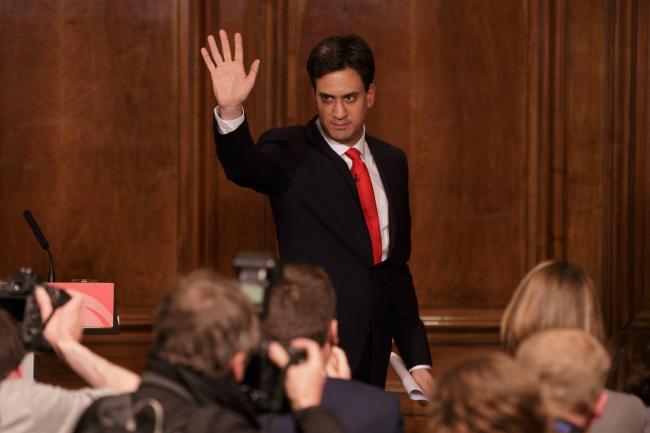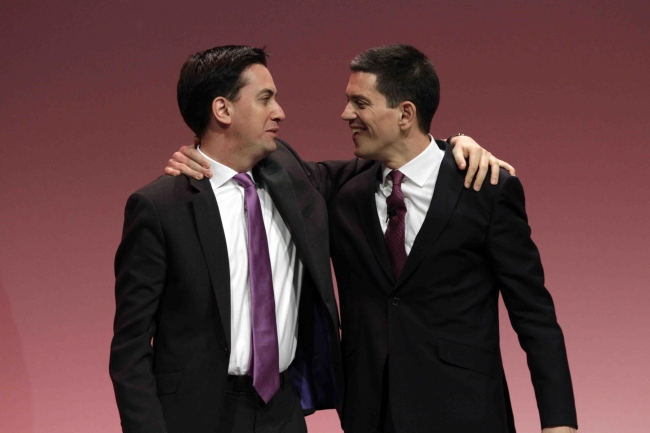Despite hopes that the public had warmed to him during a fractious campaign, Ed Miliband and his Labor Party suffered a devastating rout in Thursday's British general election, triggering his immediate resignation.
Written off as a political insider lacking charisma just a few months ago, the 45-year-old had won plaudits for his tough campaign style and some observers saw leadership material despite his awkward image.
Center-left Labor was neck-and-neck with the center-right Conservatives in opinion poll after opinion poll, helping bolster Miliband against Conservative Prime Minister David Cameron - long seen as the slicker operator.
But results revealed the chasm between himself and Cameron, who won an overall majority.
"Britain needs a strong Labor Party. It's time for someone else to take leadership of this party," Miliband told supporters in his resignation speech on Friday.
"I am truly sorry I did not succeed, I have done my best for five years,"
he said, adding: "I take absolute and total responsibility for the result."
 |
Ed Miliband. AP-Yonhap |
'Moses moment'
Miliband's gaffe-prone image was summed up in a photograph of him unattractively eating a bacon sandwich - an image much reproduced in Britain's right-wing press during the campaign.
He stumbled following a televised debate and then unveiled a giant slab of stone etched with his key pledges in what was mocked as his "Moses moment."
A father of two, married to environmental lawyer Justine Thornton, Miliband put living standards at the heart of his election campaign, insisting that an economic upturn under the Conservative-Liberal Democrat coalition has not reached ordinary people.
But he was accused by opponents of leading a party with little economic credibility, and one that was held partly responsible for the pain of austerity inflicted on Britons following the global financial crisis of 2008.
By the early hours of Friday, there was growing pressure from Labor supporters for him to stand down.
"Ed Miliband has to go after general election humiliation - the only question is when," the Daily Mirror tabloid, which endorsed Miliband in the campaign, said in an editorial.
Brother vs brother
Born to Jewish immigrant parents, a Marxist academic father and a campaigning activist mother, Miliband grew up in a London household where left-wing intellectuals from around the world came to dinner.
He became active in student politics while at Oxford University and after a stint as a journalist quickly rose through the ranks of the Labor party.
Miliband later served as energy minister and Treasury advisor in successive Labor governments.
In 2010 he alarmed many in the ranks of the party by standing against his own brother, David Miliband, in the party's leadership contest. David, a protege of former prime minister Tony Blair, was seen as less left-wing than Ed.
 |
Ed (left) and David (right) Miliband in 2010. AP-Yonhap |
David left politics and moved to the United States after his surprise defeat to his younger brother, who cast his victory as a break from the market-friendly "New Labor" of Blair and a return to the party's left-wing roots.
Miliband has since said their relationship is "healing."
But the challenge, seen by some as "an almost biblical act of fratricide"
according to Miliband's biographers, has not been forgotten.
In an interview during the campaign, Miliband was relentlessly questioned about his character and his ability to withstand the challenges ahead.
"I've been underestimated at every turn. People said I wouldn't become leader and I did. People said four years ago he can't become prime minister," he said.
On Friday, the naysayers proved right after all.
(AFP)






![[Exclusive] Hyundai Mobis eyes closer ties with BYD](http://res.heraldm.com/phpwas/restmb_idxmake.php?idx=644&simg=/content/image/2024/11/25/20241125050044_0.jpg)
![[Herald Review] 'Gangnam B-Side' combines social realism with masterful suspense, performance](http://res.heraldm.com/phpwas/restmb_idxmake.php?idx=644&simg=/content/image/2024/11/25/20241125050072_0.jpg)

